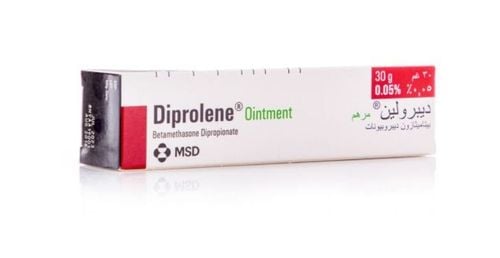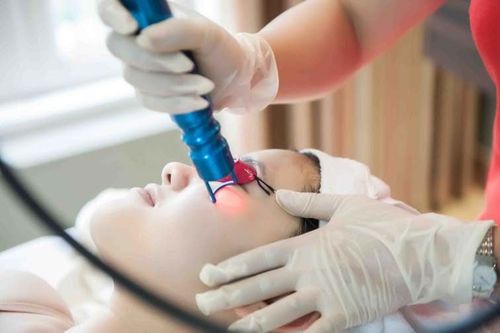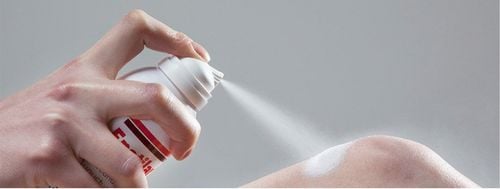This is an automatically translated article.
Acne, or simply called acne, is a common skin condition that affects many people. In North America, up to 50% of adolescents and about 15% to 30% of adults experience symptoms of the aforementioned skin condition. Many people use topical creams, medications, foods, and supplements to help reduce acne. In fact, vitamin C is frequently added to many skin care products due to its therapeutic effects.1. Skin Care with Vitamin C
Known as ascorbic acid, vitamin C is a water-soluble vitamin that plays an important role in many different aspects of health, including skin. The human body is not able to produce this vitamin on its own, so it is necessary to provide vitamin C to the body through the diet.
This vitamin is also a powerful antioxidant that helps neutralize free radicals, which are unstable compounds that can adversely affect cells in the body. The skin is affected by free radicals during exposure to both the external environment and the disturbance of the internal environment of the body.
A number of other factors such as diet, stress, smoking intensity, ultraviolet (UV) rays and environmental pollution all affect skin health.
The epidermis of the skin is the top layer that can be seen by the naked eye, containing a large amount of Vitamin C. This nutrient has the purpose of protecting, healing and creating new skin. Acne is a manifestation of skin inflammation, which can be aggravated by environmental factors. As such, vitamin C may play a role in treating them.

Người thường xuyên hút thuốc có thể gây tác động xấu đến sức khỏe của làn da
2. Effect of Vitamin C on Acne
Acne is an inflammatory skin condition caused by clogged pores, leading to red, swollen, pustules, which are inflamed pimples. Acne also leaves many people with scarring after inflammation and skin damage. However, research indicates that vitamin C can treat these symptoms.
2.1 Reduce Inflammation Age, genetics, and hormones are all risk factors for acne. Furthermore, some common skin bacteria such as Cuti Bacterium acnes (C. acnes) can cause this condition. Vitamin C is believed to be an effective anti-inflammatory, which can reduce the redness associated with acne.
In a 12-year study of 50 people, 61% of participants used a lotion containing 5% sodium ascorbyl phosphate (SAP) - there were significant improvements in acne lesions.
In a smaller, 8-week study in 30 people, those using 5% SAP experienced a 48.8% reduction in acne lesions. Furthermore, those who used a combination of SAP and 2% retinol - a Vitamin A extract - experienced a 63.1% reduction.
2.2 Treatment of dark spots After acne clears, the skin needs time to heal. If not healed properly, acne scars can develop with long-term cosmetic effects. Acne scars are often associated with severe, cystic acne, but they can also be the result of more common cases of acne.

Vitamin C có khả năng trị thâm mụn
Indented scars occur due to a lack of skin tissue and collagen, appearing as small indentations in the skin. Dark and keloid scars appear when the body overproduces collagen, scars appear as thick, raised scar tissue on the surface of the skin.
Vitamin C treats acne scars by increasing the synthesis of collagen, a protein capable of improving the structure and regeneration of healthy skin. Therefore, this vitamin can accelerate the healing of acne wounds.
A 4-week study in 30 people noted improvements to acne scars after using a non-metallic method. This procedure is performed by rolling fine needles over the skin to promote healing and boost collagen production, combined with the application of a topical cream containing 15% vitamin C once a week. However, there are still no clear results to know whether the non-cream method, Vitamin C or a combination of the two contribute to the effect on the skin.
Furthermore, the use of microneedling is not suitable for the treatment of dark and keloid scars because these two types of scars are the result of excess release of collagen.
2.3 Hypopigmentation Hyperpigmentation is the formation of dark spots caused by acne, UV rays or other damage - although this is harmless, it has a cosmetic effect on the skin. with many people.
Using Vitamin C for the skin can reduce skin pigmentation by interfering with the tyrosinase enzyme, which produces melanin, a natural skin pigment. Furthermore, vitamin C acts as a skin lightener and can reduce the appearance of dark spots without altering the natural color of the skin.
Despite this, most studies that have used Vitamin C to improve skin condition have combined other anti-pigmentation ingredients such as alpha-hydroxy acids, making it difficult to determine the effects of Vitamin C. becomes unclear. Therefore, more medical studies are needed to confirm the true effects of this vitamin.

Bên cạnh đó, có thể sử dụng Vitamin C trong điều trị giảm sắc tố da
3. Vitamin C sources and quantification
Although many foods and supplements contain vitamin C, users should be aware that skin care products formulated with vitamin C are more likely to help with acne-related conditions. . There have not been any studies to prove that a diet supplemented with Vitamin C works to reduce acne and heal scars.
3.1 Foods and Supplements The first source of Vitamin C is some fruits and vegetables like bell peppers, strawberries, tomatoes, broccoli, green vegetables and citrus fruits. Vitamin C supplements are also widely available on the market.
Although Vitamin C is a water-soluble vitamin, the body has the ability to eliminate all residues through urine. However, before supplementing with Vitamin C with supplements, users should still consult a healthcare professional.
3.2 Vitamin C skin care products are used in combination in many skin care products, such as serums, moisturizers and other topical creams. Although L-ascorbic acid is the strongest form of this vitamin, commonly used in skin care products, it is also the least stable and has a very rapid oxidation rate. Vitamin C serum boosters are very popular products, but they also have a short shelf life.
Therefore, the most common topical skin products used to use Vitamin C compounds with higher levels of stability. However, the effects of these compounds have not been shown to be as effective as L-ascorbic acid.
Products using Vitamin C are often added with the antioxidant Vitamin E to increase the shelf life of the product as well as provide additional nutrients to the skin.
To optimize the effects of these products, users should strictly follow the product's instructions for use as well as recommendations from the manufacturer.
Reference article healthline.com













